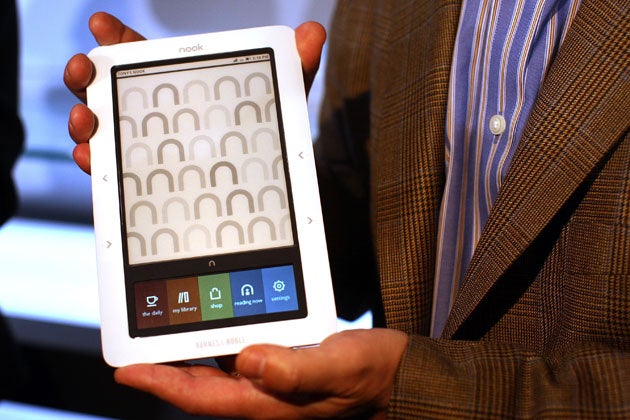Barnes & Noble's 'nook' e-book reader takes on Kindle

Your support helps us to tell the story
From reproductive rights to climate change to Big Tech, The Independent is on the ground when the story is developing. Whether it's investigating the financials of Elon Musk's pro-Trump PAC or producing our latest documentary, 'The A Word', which shines a light on the American women fighting for reproductive rights, we know how important it is to parse out the facts from the messaging.
At such a critical moment in US history, we need reporters on the ground. Your donation allows us to keep sending journalists to speak to both sides of the story.
The Independent is trusted by Americans across the entire political spectrum. And unlike many other quality news outlets, we choose not to lock Americans out of our reporting and analysis with paywalls. We believe quality journalism should be available to everyone, paid for by those who can afford it.
Your support makes all the difference.Barnes & Noble has unveiled a new electronic-book reader that will compete with Amazon.com's Kindle in a still-small arena where some see bookselling's future.
A wireless reader with 2 gigabytes of memory, the capacity to store and play MP3 files and a feature that allows users to loan out their e-books, the "nook" is available for "pre-order" on Barnes & Noble's website for $259 (£156) - the same as the recently reduced Kindle.
Less than 5 inches (13cm) wide and 8 inches (20cm) tall and weighing just over 315 grams, the company says the nook is the size and weight of a paperback book and will start shipping in November.
Author Malcolm Gladwell read from his best-seller The Tipping Point during a launch event for the device in New York. The first 10,000 people to order a nook will get a free electronic copy of the book.
Users will get free wireless access in Barnes & Noble stores, where the device will be displayed. It has a slot for adding up to 16 gigabytes more memory, a 3.5-inch colour touch screen below the page display and can store users' personal photos.
E-book readers can serve as customer retention tools as much as anything because they display only versions of books provided by the company that sells the device.
The largest US book store chain is only the latest company to enter the e-reader market, which Kindle has dominated since its 2007 launch.
Sony has sold e-readers since 2006 and plans to launch a new version with a touch screen and wireless downloading capability via AT&T in December.
Smaller companies IREX Technologies and Plastic Logic also plan to offer e-readers soon.
So far, e-readership is small.
"Only 8 per cent of the US adult population bought one e-book in 2008," and most read them on PCs, said Michael Norris, senior analyst at research firm Simba Information. "So it's a device that is extremely important to everyone except 92 per cent of American adults."
Still, the niche is growing fast in an industry that is slumping. Forrester Research predicts 3 million e-readers will sell in the US in 2009, and twice as many in 2010.
Join our commenting forum
Join thought-provoking conversations, follow other Independent readers and see their replies
111Comments